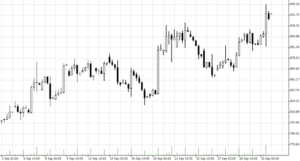

14.10.2022 – Two pieces of news have caused new nervousness in the market for wheat. One comes from Russia, the other from the United States. We shed light on the background.
First, Russia’s ambassador to the United Nations in Geneva, Gennady Gatilov, threatened that the agreement to export Ukrainian grain through the Black Sea could well be revoked. On the other hand, data from the U.S. Department of Agriculture indicate that American farmers are likely to export less wheat than they have in about half a century. The four-hour chart of wheat speaks a clear language: the market is assuming a severe shortage.

Source: Bernstein Bank GmbH
First to Russia. Gatilov, according to the Reuters news agency, said he had handed over a letter to UN Secretary-General Antonio Guterres listing concerns about extending the wheat deal brokered by Turkey. Thus, next month, an extension of the agreement may fail to materialize if Russia’s demands are not met. Specifically, the Russian diplomat is calling for better conditions for Russian exporters on grain and fertilizer. The agreement had provided reassurance on prices in July. Rabobank speculated that the breach of the deal was already priced into the market.
Ukraine harvest at risk
However, consultancy McKinsey continued to see problems in the market regardless of the export agreement. Because of the fighting and the minefields, the coming harvest in Ukraine will be 35 to 45 percent lower. Whereas, again, the U.S. Department of Agriculture, in its World Agricultural Demand and Supply Estimates a month ago, sees an increase in the global crop – which is mainly due to Russia. Our take: Russian grain might not reach the West because of sanctions.
Fewer U.S. exports
Further, financial blog ZeroHedge reported the U.S. Department of Agriculture has lowered its outlook for U.S. exports in the coming season by 50 million bushels to 775 million. This would be the lowest level since 1971. Already almost a month ago, several high-ranking agro-managers from Bayer, Corteva, Archer Daniels Midland and Bunge had sounded the alarm in the “Wall Street Journal”. According to them, it would take at least two good harvests in North and South America to relieve the supply pressure. Both regions went through extreme droughts in the summer.
The conclusion to be drawn from this mixed situation is that the supply of wheat to the Western world is probably facing some problems at the moment. Which should drive prices. Bernstein Bank is keeping an eye on the situation for you.
________________________________________________________________________________________________________________________________________________________________________
The content of this publication is for general information purposes only. In this context, it is neither an individual investment recommendation or advice nor an offer to purchase or sell securities or other financial products. The content in question and all the information contained therein do not in any way replace individual investor- or investment-oriented advice. No reliable forecast or indication for the future is possible with respect to any presentation or information on the present or past performance of the relevant underlying assets. All information and data presented in this publication are based on reliable sources. However, Bernstein Bank does not guarantee that the information and data contained in this publication is up-to-date, correct and complete. Securities traded on the financial markets are subject to price fluctuations. A contract for difference (CFD) is also a financial instrument with leverage effect. Against this backdrop, CFD trading involves a high risk up to the point of total loss and may not be suitable for all investors. Therefore, make sure that you have fully understood all the correlating risks. If necessary, ask for independent advice. CFDs are complex instruments and are associated with the high risk of losing money quickly because of the leverage effect. 68% of retail investor accounts lose money trading CFD with this provider. You should consider whether you understand how CFD work and whether you can afford to take the high risk of losing your money.7
